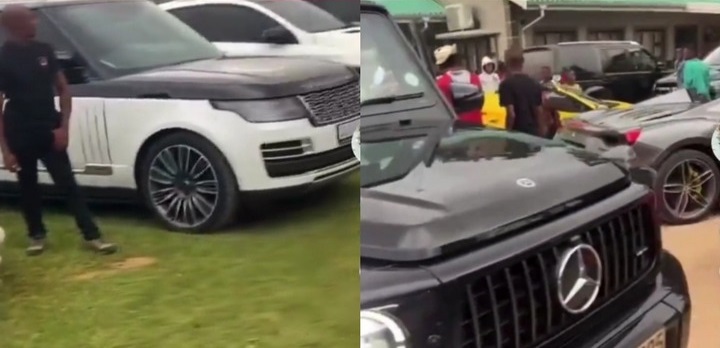In a scene reminiscent of opulence intertwined with controversy, the Gcaba family event showcased a fleet of luxurious cars that left onlookers in awe and raised eyebrows among critics. Known as the nephews of Jacob Zuma, aligned with the MK Party, the Gcaba family holds a notorious reputation as the purported biggest taxi warlords in South Africa. Their lavish display of wealth at the recent event has reignited concerns about their influence and the sources of their prosperity.
The event, attended by prominent figures and members of the community, drew attention not only for its extravagant setting but also for the conspicuous array of vehicles lined up outside the venue. From sleek sedans to imposing SUVs, the Gcaba family’s fleet of cars painted a picture of affluence and power, reflecting their alleged dominance in the transportation industry.
However, behind the façade of luxury lies a web of controversy and allegations. Jacob Zuma, during his tenure as president, is said to have facilitated numerous tenders for the Gcaba family, including the lucrative contract for the Durban Municipal Bus service. Despite being entrusted with such responsibilities, reports suggest that the Gcaba-led management has failed to deliver, resulting in the collapse of the public transport system in KwaZulu-Natal (KZN), South Africa.
This is what the fleet of cars looks like at a Gcaba family event. The notorious Gcaba’s are nephews of MK Party aligned Jacob Zuma. They are said to be the biggest taxi warlords in the country. Zuma facilitated dozens of tenders for them while president including the Durban… pic.twitter.com/Tp4ZszIWjI
— Goolam (@goolammv) March 27, 2024
Critics argue that the Gcaba family’s involvement in the transportation sector has been detrimental to the interests of the public, leading to inefficiencies, mismanagement, and ultimately, the deterioration of essential services. The collapse of the Durban Municipal Bus service, once a vital lifeline for residents, serves as a stark reminder of the consequences of unchecked influence and nepotism.
Moreover, concerns have been raised regarding the alleged connections between the Gcaba family and organized crime syndicates, particularly in the taxi industry. As self-proclaimed “warlords,” they purportedly wield significant influence over routes, fares, and operations, often resorting to violence and intimidation to maintain their dominance. Such allegations have further tarnished their reputation and raised questions about their suitability to hold positions of power.
Amidst mounting scrutiny, the Gcaba family remains defiant, asserting their innocence and dismissing accusations of wrongdoing. They maintain that their success is a result of hard work, entrepreneurship, and legitimate business ventures. However, skeptics remain unconvinced, pointing to the lack of transparency surrounding their operations and the suspicious manner in which they acquired lucrative contracts.
The lavish display of wealth at the recent family event has only served to exacerbate tensions and fuel speculation about the true nature of their wealth. For many, it symbolizes the glaring disparities in South African society, where a select few wield immense power and privilege while the majority struggle to make ends meet.
In response to the growing outcry, calls have been made for a thorough investigation into the Gcaba family’s business dealings and connections. Civil society organizations, political leaders, and concerned citizens are demanding accountability and transparency, calling for justice to be served and the interests of the public to be prioritized above all else.
As the controversy surrounding the Gcaba family continues to unfold, it serves as a stark reminder of the challenges facing South Africa as it strives to address corruption, inequality, and injustice. The lavish display of cars at the recent event may have captured attention, but it is the underlying issues of accountability and ethical governance that demand urgent action and resolution.






















